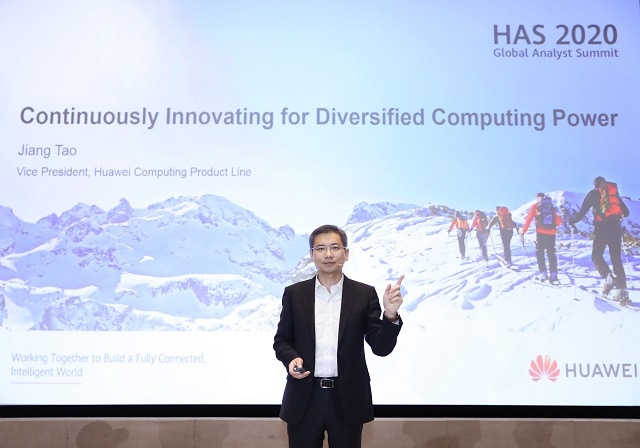Huawei Continuously Innovates to Meet the Demands for Diversified Computing Power
Jiang Tao, Vice President of Huawei Computing, revealed the latest achievements from Huawei in computing innovation at Huawei Global Analyst Summit 2020 (HAS 2020). Huawei has continuously built competitive computing products and solutions with years of technical expertise in this field to meet the demands of diversified computing. According to Jiang Tao, Huawei's computing product shipments grew by 8% in 2019.

Jiang Tao discussing computing industry trends.
Intelligent Huawei Servers Transform Data Centers
Huawei has built a variety of intelligent engines into the x86 computing platform to create intelligent upgrades for data centers. Its latest x86 FusionServer Pro employs the cutting-edge Cascade Lake Refresh processors and OptaneTM DC Persistent Memory from Intel. The FusionServer Pro V5 servers are currently available for mainstream sale. The V6 servers will be released with the next generation of Intel processors.
Huawei has introduced intelligent acceleration and management engines to address the challenges of traditional data centers. These innovative components work with Intel processors to maximize server performance at the system level. FusionDirector works as an intelligent management engine to increase O&M efficiency and subsequently reduce O&M costs throughout the server lifecycle.
Device-Edge-Cloud Collaboration Makes AI a Reality
The Atlas AI computing solution provides a full product portfolio for all scenarios across the cloud, edge, and devices, and has been put into commercial use in the Internet, carrier, finance, energy, and manufacturing industries.
Huawei introduced Atlas use cases from a variety of industries at HAS 2020 to demonstrate how Atlas realizes the potential of AI to resolve the most difficult issues facing traditional industries.
The manufacturing industry has long relied on manual inspection, especially for complex products. Huawei has redefined inspection by combining Atlas 300 with industrial computers to provide machine vision for intelligent inspection at its global manufacturing center in the Chinese city of Dongguan. On a production line that manufactures Atlas, this solution detects label defects and missing screws to boost the inspection efficiency from 90% to 100%. This is a real-world case of using Atlas to intelligently produce Atlas.
Huawei worked with AGS Italy to build an AI diagnosis system for medical images. The system uses the Atlas 800 server and Atlas 300 inference card to quickly generate accurate reports for image diagnosis. Diagnosis time dropped from 10–15 minutes to 10–20 seconds. Early diagnosis is a critical advantage in the medical field, especially during emergencies like the current COVID-19 outbreak. This Atlas-powered solution provides quick treatment options and management of triage medical resources by severity of disease, helping the frontline medical workers fight the coronavirus more efficiently.
Huawei remains committed to investing in innovation to power the world with diversified computing. Its full-stack computing solutions for all scenarios across the cloud, edge, and devices are redefining data centers, fueling transformation across industries, and building collaboration for a fully connected, intelligent world.

Jiang Tao discussing computing industry trends.
Intelligent Huawei Servers Transform Data Centers
Huawei has built a variety of intelligent engines into the x86 computing platform to create intelligent upgrades for data centers. Its latest x86 FusionServer Pro employs the cutting-edge Cascade Lake Refresh processors and OptaneTM DC Persistent Memory from Intel. The FusionServer Pro V5 servers are currently available for mainstream sale. The V6 servers will be released with the next generation of Intel processors.
Huawei has introduced intelligent acceleration and management engines to address the challenges of traditional data centers. These innovative components work with Intel processors to maximize server performance at the system level. FusionDirector works as an intelligent management engine to increase O&M efficiency and subsequently reduce O&M costs throughout the server lifecycle.
Device-Edge-Cloud Collaboration Makes AI a Reality
The Atlas AI computing solution provides a full product portfolio for all scenarios across the cloud, edge, and devices, and has been put into commercial use in the Internet, carrier, finance, energy, and manufacturing industries.
Huawei introduced Atlas use cases from a variety of industries at HAS 2020 to demonstrate how Atlas realizes the potential of AI to resolve the most difficult issues facing traditional industries.
The manufacturing industry has long relied on manual inspection, especially for complex products. Huawei has redefined inspection by combining Atlas 300 with industrial computers to provide machine vision for intelligent inspection at its global manufacturing center in the Chinese city of Dongguan. On a production line that manufactures Atlas, this solution detects label defects and missing screws to boost the inspection efficiency from 90% to 100%. This is a real-world case of using Atlas to intelligently produce Atlas.
Huawei worked with AGS Italy to build an AI diagnosis system for medical images. The system uses the Atlas 800 server and Atlas 300 inference card to quickly generate accurate reports for image diagnosis. Diagnosis time dropped from 10–15 minutes to 10–20 seconds. Early diagnosis is a critical advantage in the medical field, especially during emergencies like the current COVID-19 outbreak. This Atlas-powered solution provides quick treatment options and management of triage medical resources by severity of disease, helping the frontline medical workers fight the coronavirus more efficiently.
Huawei remains committed to investing in innovation to power the world with diversified computing. Its full-stack computing solutions for all scenarios across the cloud, edge, and devices are redefining data centers, fueling transformation across industries, and building collaboration for a fully connected, intelligent world.





No comments: